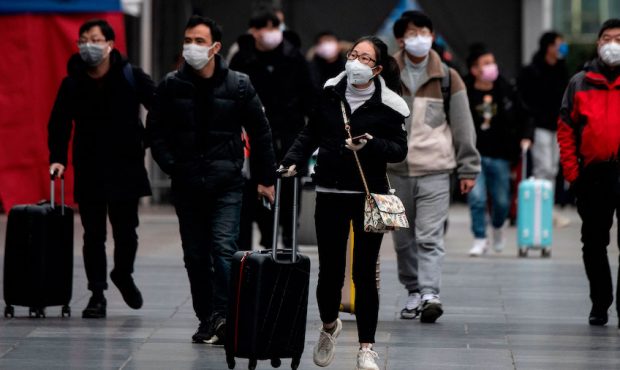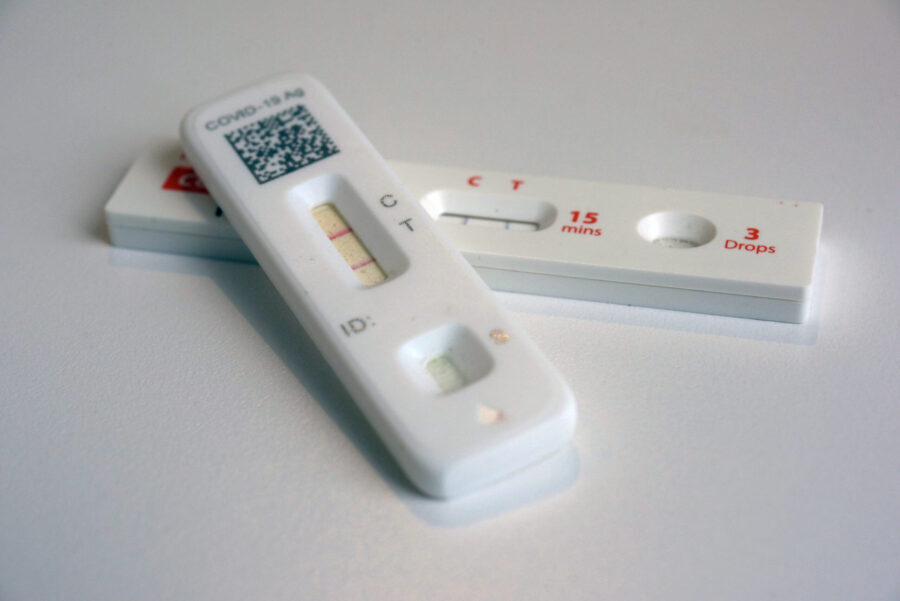What Is A Pandemic?
Mar 11, 2020, 11:30 AM | Updated: 11:47 am

People wearing protective face masks arrive at a railway station in Shanghai on February 10, 2020. - The death toll from the novel coronavirus surged past 900 in mainland China on February 10, overtaking global fatalities in the 2002-03 SARS epidemic, even as the World Health Organization said the outbreak appeared to be stabilising. (Photo by NOEL CELIS / AFP) (Photo by NOEL CELIS/AFP via Getty Images)
(Photo by NOEL CELIS/AFP via Getty Images)
(CNN) — The deadly novel coronavirus outbreak has turned a spotlight on the science of disease, raising the question: Exactly what is a pandemic?
An outbreak is the occurrence of disease cases in excess of what’s normally expected, according to the World Health Organization. An epidemic is more than a normal number cases of an illness, specific health-related behavior or other health-related events in a community or region.
Yet a pandemic is defined as the “worldwide spread” of a new disease.
The last pandemic reported in the world was the H1N1 flu pandemic in 2009, which killed hundreds of thousands globally.
The word “pandemic” comes from the Greek “pandemos,” which means everybody. Demos means the population. Pan meaning everyone. So “pandemos” is a concept where there’s a belief that the whole world’s population will likely be exposed to this infection and potentially a proportion of them fall sick,” Dr. Mike Ryan, WHO executive director of the agency’s Health Emergencies Programme, said during a press briefing with reporters on Monday.
When it comes specifically to the novel coronavirus disease or Covid-19, “what we don’t understand yet in Covid-19 are the absolute transmission dynamics,” Ryan said.
“We’re in a phase of preparedness for a potential pandemic,” he said. “Let’s focus on what we can do and what we need to do, which is prepare. When we mean prepare, we mean prepare to detect cases, prepare to treat cases, prepare to follow contacts, prepare to put in place adequate containment measures.”
What is a pandemic?: ‘Different things to different people’
Dr. Anthony Fauci, director of the US National Institute of Allergy and Infectious Diseases, said in February that there is no actual scientific, definitive definition of what constitutes a pandemic.
“It really is borderline semantics, to be honest with you,” Fauci said.
He added that there could be arguments on either side as to whether the coronavirus outbreak could be described as a pandemic.
“I think you could have people arguing each end of it,” he said. “Pandemics mean different things to different people.”
In general, the WHO avoids declaring public health situations that are not flu pandemics as pandemics. For flu, the term has been used to describe pandemic influenza preparedness.
Otherwise, the WHO no longer uses an old system that involved describing phases of pandemic influenza as ranging from no reports of human infections to “a pandemic.”
“This change came about because of lessons learned from the 2009 H1N1 experience,” WHO spokesperson Tarik Jasarevic said in an email.
In January, the WHO declared the novel coronavirus outbreak a public health emergency of international concern.
“Since then, we have seen cases, clusters and outbreaks reported in multiple countries. Most of these cases, clusters and outbreaks are traceable, meaning that widespread community transmission is not evident. Some countries have even slowed or stopped transmission. They must remain alert for the possibility of reintroduction. There will likely be more cases in more places,” Jasarevic said in his email.
WHO declared the COVID-19 crisis a pandemic on March 11.
Pandemics of the past
Pandemics have been a part of human history for centuries, with one of the earliest ever reported dating back to 1580. Since then, at least four pandemics of influenza occurred in the 19th century and three occurred in the 20th century, according to the CDC.
The most severe pandemic in recent history was the 1918 influenza pandemic, sometimes referred to as the “Spanish flu.” The pandemic was estimated to have infected about 500 million people or one-third of the world’s population and killed some 50 million worldwide.
There remains some debate about where this H1N1 flu virus originated, but scientists have found that the virus had genes of avian origin. In other words, it had a connection to birds.
More American soldiers died from the 1918 flu pandemic than were killed in battle during World War I in 1918, according to the CDC. In 1919, the pandemic subsided but the H1N1 virus continued to circulate seasonally for 38 years.
Then in 1957, a novel influenza A H2N2 virus emerged in East Asia, triggering a pandemic that is estimated to have killed 1.1 million worldwide and 116,000 in the United States. The virus was comprised of genes that could be linked to an avian influenza A virus, suggesting it had a connection to birds.
The virus was first reported in Singapore in February 1957, Hong Kong in April 1957, and in coastal cities in the United States in the summer of that same year. Yet its survival in the human population was short and the virus disappeared about a decade after its arrival. Some scientists suggest that it was supplanted by a H3N2 subtype.
In 1968, a pandemic caused by an influenza A H3N2 virus that originated in China swept the world. That virus was comprised of two genes from an avian influenza A virus, according to the CDC.
The virus was first noted in the United States in September 1968 and led to about 100,000 deaths nationwide and 1 million worldwide. Most excess deaths were in adults 65 and older, according to the CDC.
The H3N2 virus continues to circulate globally as a seasonal flu virus.
In the spring of 2009, a novel influenza A H1N1 virus emerged. It was detected first in the United States and then spread quickly across the world.
The virus contained “a unique combination of influenza genes not previously identified in animals or people,” according to the CDC. It was found to be of swine origin.
During that H1N1 pandemic, the CDC estimated that somewhere between 151,700 and 575,400 people died worldwide during the first year the virus circulated. Globally, 80% of the deaths were estimated to have occurred in people younger than 65.
The World Health Organization declared the global H1N1 pandemic over in August 2010, but the H1N1 virus continues to circulate as a seasonal flu virus every year.
“This is unprecedented,” Dr. Tom Frieden, former director of the CDC, wrote in an article published on CNN.com.
“Other than influenza, no other respiratory virus has been tracked from emergence to continuous global spread. The last moderately severe influenza pandemics were in 1957 and 1968; each killed more than a million people around the world,” Frieden wrote. “Although we are far more prepared than in the past, we are also far more interconnected, and many more people today have chronic health problems that make viral infections particularly dangerous.”
Coronavirus Resources
Have you or a family member been affected by coronavirus issues in Utah? KSL wants to hear from you. Contact KSL by emailing social@ksl.com.
What is COVID-19? Here’s What You Need To Know To Stay Healthy: ksltv.com/432037/what-is-covid-19/
Latest coronavirus stories from KSL can be found at ksltv.com/coronavirus/.
Where in the world has the coronavirus already appeared? See the map: ksltv.com/?p=432035
Your Life Your Health: How can parents prepare their home, children against coronavirus: ksltv.com/?p=432060
Latest information from the Centers for Disease Control and Prevention (CDC) about the public response to the coronavirus disease outbreak.
The Intermountain Healthcare GermWatch gives you the latest information on disease activity of all kinds going around in Utah.
How do I prevent it?
The CDC has some simple recommendations, most of which are the same for preventing other respiratory illnesses or the flu:
- Avoid close contact with people who may be sick
- Avoid touching your face
- Stay home when you are sick
- Cover your cough or sneeze with a tissue and then throw the tissue in the trash
- Wash your hands often with soap and water for at least 20 seconds, especially after going to the bathroom, before eating, and after blowing your nose, coughing or sneezing. Always wash your hands with soap and water if your hands are visibly dirty.
- If soap and water is not readily available, use an alcohol-based hand sanitizer with at least 60% alcohol.
The CDC does not recommend wearing a facemask respirator to protect yourself from coronavirus unless a healthcare professional recommends it.
If you’re worried about whether you may have COVID-19, you can contact the Utah Coronavirus Information Line at 1-800-456-7707 to speak to trained healthcare professional.











